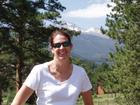A library pundit is the best way I can describe Karen Schneider. She is one of those people who are blessed with a quick, sarcastic wit and a well developed intellect to support it. I enjoyed her presentation very much although I’m not entirely sure that I agree with all of her ideas. Please also bear in mind that this was the first session of the second day of the conference and, in addition to not being quite awake yet, I was fretting about the three meetings I had to chair during the rest of the day.
• From the perspective of a writer/essayist, what she calls the “production process of the serials ecology” includes: reflection, research, revision, work shopping, submission, revision, layout and printing.
• Relevant features of the ecology include: a nominal income to editor, author’s compensation is a year’s subscription to the publication but also provides the chance for her to write about a topic that is important to her.
• Memory work: history is built from artifacts as opposed to the memories of the people who lived it. She proposes that librarians work is memory work which gives it a curatorial aspect.
• She quoted Andrew Abbott from his book The System of Professions (which I heartily recommend if you haven’t read it) who says that a profession has (or should have) “complete, legally established control” over its domain. This, she maintains, is the basis of what she calls the ‘state of emergency’ in libraries since our control of collections and collection building (if, indeed, we ever had it) is being eroded or encroached upon by entities outside the profession.
• She maintains that particularly in the area of serials, we’re particularly susceptible to this. For example the publishers with whom we’re made “big deals.”
• Some of the concerns that she’s currently mulling are
o Why are we (libraries) allowing Google to create a proprietary collection of the world’s books? (apparently Google’s contracts with both the University of California and the University of Michigan include a clause that keeps the institutions from delivering the content that they’ve allowed Google to digitize to anyone other than Google, something I didn’t know). Same with Microsoft’s book project. AND Google search doesn’t reach the Microsoft book “silo” and vice versa, you can’t access content in Google books using any other search engine. I find this incredibly worrisome. The open content alliance is an non-proprietary version of the Google book search.
o Why do we (libraries) need to pay an organization an annual fee to give us temporary access on a remote server to the content that we already own? I’d say because our users are requiring us to.
o Why does Time-Warner have to be so greedy? For example, the recent postal rate increase impacts small presses to a much larger extent than it does publishers like Time-Warner who nas negotiated a lower postal rate. This is damaging to the serials ecology.
• Removing information from the public record is a concern of hers that she illustratd with the closing of the EPA libraries which she sees as a part of a larger movement of information being lost from the public/historical record. LOCKSS/CLOCKSS is a library grown innovation designed to protect the interests of librarianship and is . There is no license to create a “LOCKSS box”, it’s free, open-source software.
• Lessons:
o The right path is not always instinctive, obvious, or well marked
o ignore the dazzle and read the fine print
o bring our values (as librarians) to the table
o possession IS the law
• Interesting thought: people slam Disney over the 2003 copyright ruling but don’t blink an eye at apple who distributes a proprietary sound format for ipods. What makes Apple different from Disney?

Subscribe to:
Post Comments (Atom)
Live chat
About Me

- SWS
- I am... a wife a daughter a sister/sister-in-law an aunt a reader a librarian a doctor a quilter a niece a grandmother ;-) a cat owner 6 feet 1 inches tall a yoga enthusiast a cook
Blog Archive
-
▼
2007
(63)
-
▼
June
(26)
- ALA 2007 – Eye to I: Visual Literacy Meets Informa...
- ALA 2007 - The Future of Information Retrieval
- ALA 2007 - Utilizing learning theory in online env...
- ALA 2007 - LRRT Research Forum: Information Seekin...
- ALA 2007 - Library Research Round Table Research F...
- ALA 2007 - Library Research Round Table Research F...
- Informing the future of MARC: An empirical approach
- ‘Research Methods in Information’ chapters 9 and 10
- ‘Research Methods in Information’ chapters 7 & 8
- "Research Methods in Information" chapters 5 & 6
- Need a laugh?
- 'Research Methods in Information' chapters 3 & 4
- NASIG 2007: final thoughts
- NASIG 2007: Education trifecta: win attention, pla...
- NASIG 2007: How does digitization affect scholarship?
- NASIG 2007: Hurry up please. It’s time – State of ...
- ALA 2007 schedule
- "Research Methods in Information", chapter 2
- "Research Methods in Information" chapter 1
- "Research Methods in Information"
- Too good not to share
- NASIG 2007: Betting a strong hand in the game of e...
- NASIG 2007: Alternatives to licensing of e-resources
- NASIG 2007: Electronic resources workflow management
- NASIG 2007: "What's the different about the social...
- NASIG 2007 conference: opening session
-
▼
June
(26)
No comments:
Post a Comment